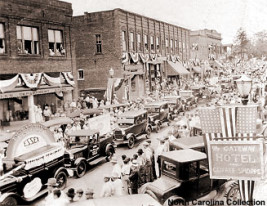
Rutherford
was formed in 1779 from Tryon. It was named in honor
of Griffith Rutherford, one of the most prominent of
the Revolutionary patriots. He led the expedition
that crushed the Cherokees in 1776, and rendered
important services both in the Legislature and on
the battlefield. It is in the southwestern section
of the State and is bounded by the state of South
Carolina and Polk, Henderson, McDowell, Burke and
Cleveland counties.
Its present land
area is 564.12 square miles and the 2000 population
was 62,901. The act establishing the county provided
that the first court be held at the home of Joseph
Walker and the justices were to decide on the most
convenient place to hold succeeding courts until a
courthouse could be erected.
 Commissioners were
named to select a place for the county seat. In 1781
an act was passed stating that the original act had
not been fully carried out and that the previous
commissioners had failed to erect a courthouse even
though they had selected the land of
James
Holland in the fork of Shepard's Creek. The act
authorized the commissioners to purchase fifty acres
of land from James Holland and erect the buildings.
In 1784 an act was passed which stated that the
place selected by the commissioners was not
convenient; therefore, new commissioners were named
to survey the county, locate the center, purchase
land and erect the public buildings. In 1787
Rutherford was established on the land purchased for
the county seat. Two acres were reserved for the
public buildings. Rutherfordton was incorporated in
1793 and is the county seat. Commissioners were
named to select a place for the county seat. In 1781
an act was passed stating that the original act had
not been fully carried out and that the previous
commissioners had failed to erect a courthouse even
though they had selected the land of
James
Holland in the fork of Shepard's Creek. The act
authorized the commissioners to purchase fifty acres
of land from James Holland and erect the buildings.
In 1784 an act was passed which stated that the
place selected by the commissioners was not
convenient; therefore, new commissioners were named
to survey the county, locate the center, purchase
land and erect the public buildings. In 1787
Rutherford was established on the land purchased for
the county seat. Two acres were reserved for the
public buildings. Rutherfordton was incorporated in
1793 and is the county seat.
 In
1791 parts of Rutherford County and Burke County
were combined to form Buncombe County. In 1841 parts
of Rutherford County and Lincoln County were
combined to form Cleveland County. In 1842
additional parts of Rutherford County and Burke
County were combined to form McDowell County.
Finally, in 1855 parts of Rutherford County and
Henderson County were combined to form Polk County. In
1791 parts of Rutherford County and Burke County
were combined to form Buncombe County. In 1841 parts
of Rutherford County and Lincoln County were
combined to form Cleveland County. In 1842
additional parts of Rutherford County and Burke
County were combined to form McDowell County.
Finally, in 1855 parts of Rutherford County and
Henderson County were combined to form Polk County.
Rutherford County was named for Griffith Rutherford,
a Provincial Congress member and Revolutionary
general. Many of the county's early settlers were
of Scotts-Irish origin from Pennsylvania.
|